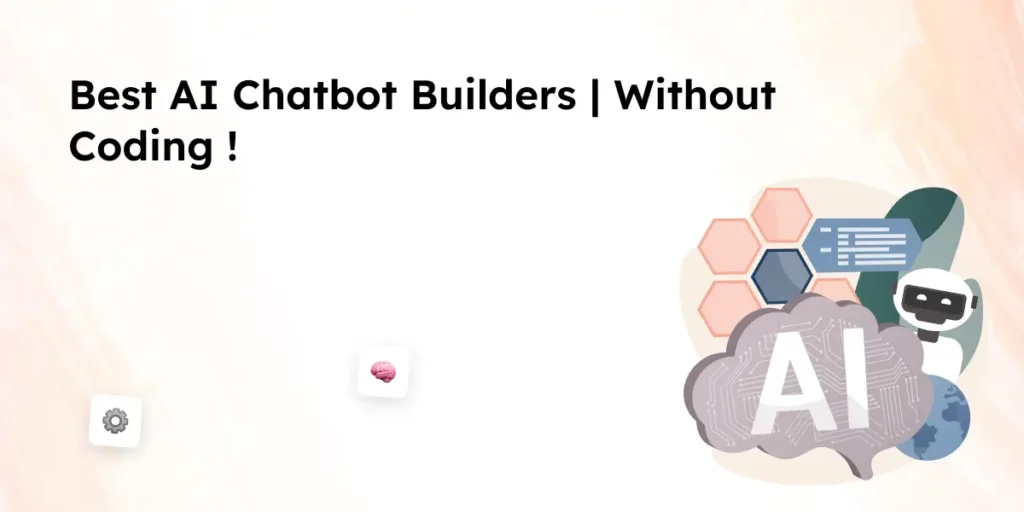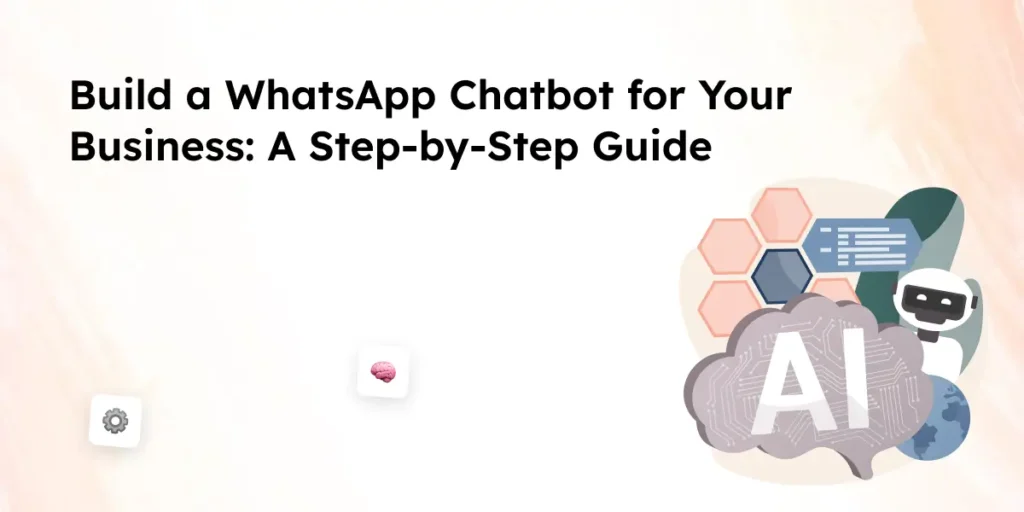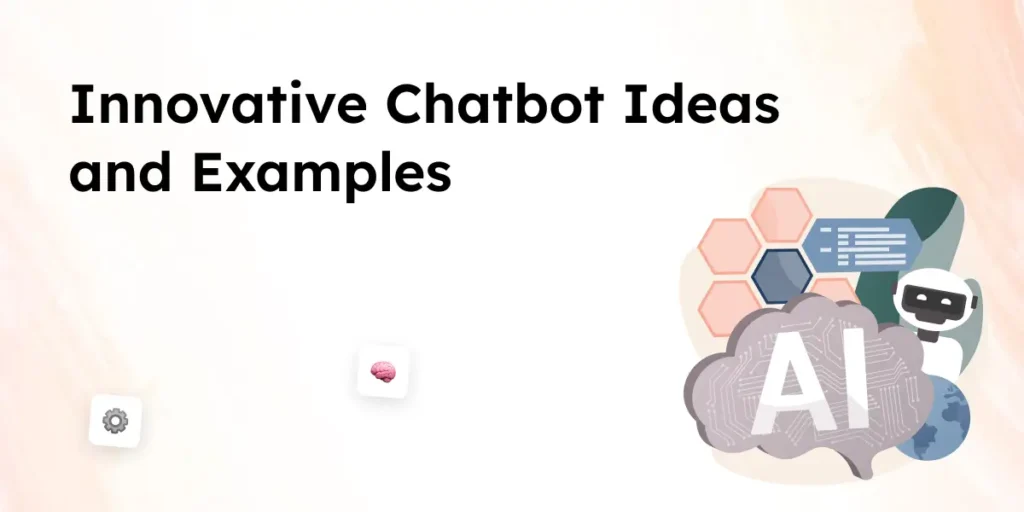Customer service chatbots have become essential tools for businesses looking to improve response times, reduce costs, and provide 24/7 support. In 2025, chatbot technology has advanced significantly, offering more natural conversations, seamless integrations, and AI-driven automation. But with so many options available, how do businesses choose the right one? Choosing the right AI chatbot software is important, but ensuring it follows effective chatbot strategies is equally crucial. Learn more in our best practices guide.
This guide will highlight the 10 best customer service chatbots in 2025 for SMEs and enterprises. We’ll cover their key features, pricing models, scalability, and how they integrate with existing systems. By the end, you’ll have a clear understanding of which chatbot fits your business needs.
Criteria for Evaluation
Choosing the right customer service chatbot depends on several factors. Businesses need a solution that fits their workflow, scales with their growth, and enhances customer experience. Here are the key factors we considered when ranking the top chatbots for 2025:
1. Features and Capabilities
A good chatbot should do more than just answer FAQs. We looked for AI-powered bots with natural language processing (NLP), sentiment analysis, multilingual support, and the ability to handle complex customer queries.
2. Integration with Existing Systems
Chatbots must work seamlessly with CRM platforms, help desks, e-commerce stores, and messaging apps. We evaluated how well each chatbot integrates with tools like Salesforce, Zendesk, HubSpot, Shopify, and Slack.
3. Scalability and Customization
SMEs and enterprises have different needs. We examined whether these chatbots can scale to handle increasing customer interactions and whether they offer customization options for branding, workflows, and automated responses.
4. Pricing and Affordability
Cost is a major factor. Some chatbots charge per conversation, while others have a fixed monthly fee. We compared pricing models to find the best options for small businesses and large enterprises.
5. User Experience and Ease of Use
A chatbot should be easy to set up and manage. We considered whether these chatbots offer a no-code or low-code interface for businesses that don’t have a dedicated IT team.
6. Security and Compliance
Handling customer data requires strong security measures. We checked if these chatbots follow industry standards like GDPR, HIPAA, and ISO 27001, ensuring that sensitive customer information stays protected.
7. Analytics and Reporting
Businesses need insights into chatbot performance which is decide by chatbot analytics metrics. We examined whether these chatbots provide detailed analytics on customer interactions, response times, and issue resolution rates to help businesses improve their customer service strategy.
👉 If you’re looking to understand how AI chatbots work, their benefits, and how to choose the best one for your business, check out our detailed AI Chatbots Guide for more insights.
Top 10 Customer Service AI Chatbots in 2025
| Chatbot | Best For | Key Features | Pricing |
|---|---|---|---|
| Converzation AI | Enterprises, SMEs | AI-driven automation, omnichannel support | Starts at $19/month |
| Intercom | Businesses needing automation + live chat | Customizable workflows, lead qualification | Starts at $74/month |
| Desku.io | Small Businesses, SMEs, Startups | Conversational AI, Omnichannel Inbox | Starts at $19/month |
| Freshchat | SMEs needing omnichannel support | No-code chatbot builder, CRM integration | Starts at $19/month |
| Tidio | E-commerce businesses | Shopify/WooCommerce integration, multilingual | Free; paid from $39/mo |
| Ada AI | Enterprises needing full automation | Self-learning AI, deep CRM integrations | Custom pricing |
| LivePerson | Advanced AI and human-agent collaboration | Predictive analytics, voice + text support | Custom pricing |
| Chatfuel | Social media customer support | Messenger & Instagram automation, templates | Free; paid from $15/mo |
| Botsify | Small businesses, startups | No-code chatbot builder, voice AI support | Starts at $49/month |
| Yellow.ai | Enterprise-grade AI automation | Voice + text chatbots, omnichannel support | Custom pricing |
Top 10 Customer Service Chatbots in 2025
Below is a list of the best customer service chatbots, chosen based on features, integrations, scalability, pricing, and ease of use.
1.Desku’s Eva AI Chatbot
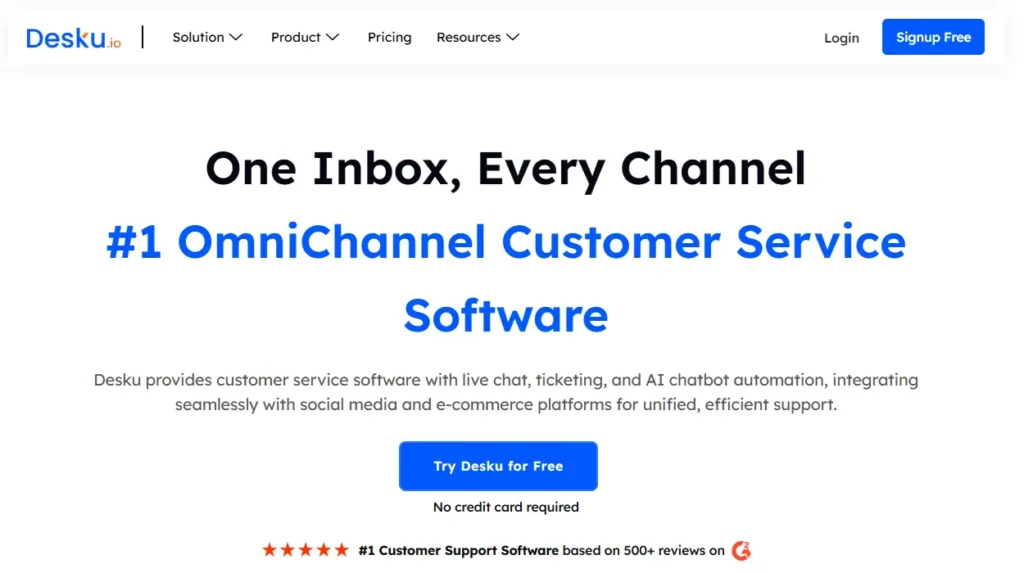
Best for: SMEs and enterprises looking for an AI-driven customer support assistant.
Desku’s Eva AI chatbot is designed to automate customer service operations, providing quick and accurate responses across multiple channels. It integrates seamlessly with Desku’s support suite, ensuring a smooth workflow for support teams.
Key Features:
- AI-driven automation for handling common customer queries.
- Multilingual support to engage with a global audience.
- Omnichannel integration with WhatsApp, Facebook, Instagram, and websites.
- Quick setup for instant deployment without technical expertise.
Pricing: Custom pricing based on business needs.
2. Intercom Chatbot

Best for: Businesses looking for a mix of automation and live chat.
Intercom’s chatbot is designed to qualify leads, resolve issues, and transfer complex queries to human agents when needed. It offers no-code customization, making it easy to set up.
Key Features:
- Customizable workflows and automation.
- Proactive chat support based on user behavior.
- AI-powered lead qualification and routing.
- Integration with CRM tools like Salesforce and HubSpot.
Pricing: Starts at $74/month, varies based on features and usage.
3.Converzation AI

Best for: Businesses looking for a chatbot trained on their existing content and knowledge base.
Converzation AI enables businesses to create custom AI chatbots powered by ChatGPT, allowing them to provide instant, accurate responses based on their documentation and FAQs.
Key Features:
- Instant AI responses trained on company-specific content.
- Automates repetitive support queries, reducing agent workload.
- Scalable solution that handles multiple interactions simultaneously.
- Easy integration with existing systems for a seamless experience.
Pricing: Custom pricing based on business requirements.
Pricing: Custom pricing based on business size.
4. Freshchat by Freshworks

Best for: Small to mid-sized businesses needing omnichannel support.
Freshchat offers an AI-driven chatbot that integrates with email, chat, WhatsApp, and other platforms. It helps businesses automate repetitive queries while allowing easy escalation to human agents.
Key Features:
- AI-powered customer intent detection.
- No-code chatbot builder.
- Integration with Freshdesk and other CRM tools.
- Self-service options for customers.
Pricing: Free for basic chat; paid plans start at $19/month per agent.
5. Tidio AI Chatbot

Best for: E-commerce businesses looking for automation.
Tidio’s chatbot is popular among online stores, helping businesses automate support, recommend products, and recover abandoned carts. It supports both AI-powered and rule-based chat flows.
Key Features:
- AI-driven responses with learning capabilities.
- Shopify, WooCommerce, and Magento integration.
- Multilingual support for global businesses.
- Pre-built chatbot templates.
Pricing: Free for basic use; premium starts at $39/month.
6. Ada AI Chatbot
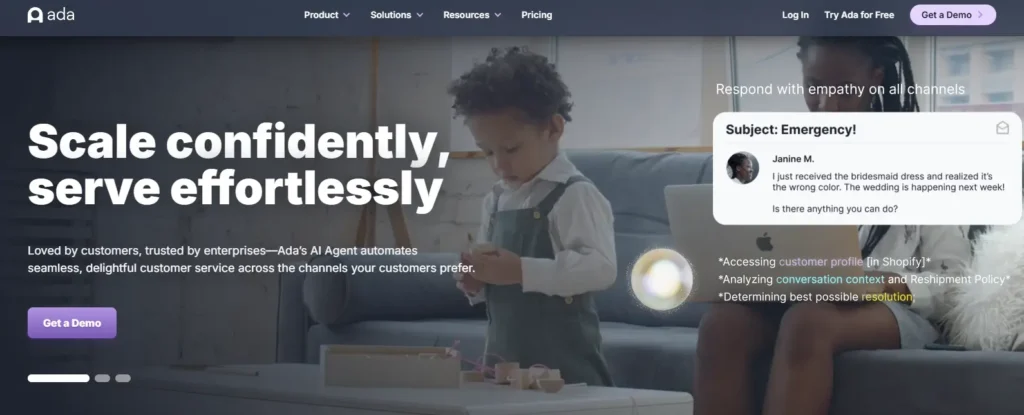
Best for: Enterprises looking for full automation.
Ada is an enterprise-grade AI chatbot designed to handle high volumes of customer queries without human intervention. It uses deep learning to improve responses over time.
Key Features:
- AI-driven self-learning chatbot.
- High-level automation for repetitive tasks.
- Deep integration with enterprise CRM and ticketing tools.
- Advanced analytics and reporting.
Pricing: Custom pricing based on company needs.
7. LivePerson AI Bot

Best for: Companies needing advanced AI and human-agent collaboration.
LivePerson uses Conversational AI to automate and improve customer interactions across multiple channels. It can switch seamlessly between chatbot and live agent support.
Key Features:
- AI-powered chatbot intent recognition.
- Support for voice and text-based interactions.
- CRM and e-commerce integrations.
- Predictive analytics for improving responses.
Pricing: Custom pricing based on usage.
8. Chatfuel AI Chatbot
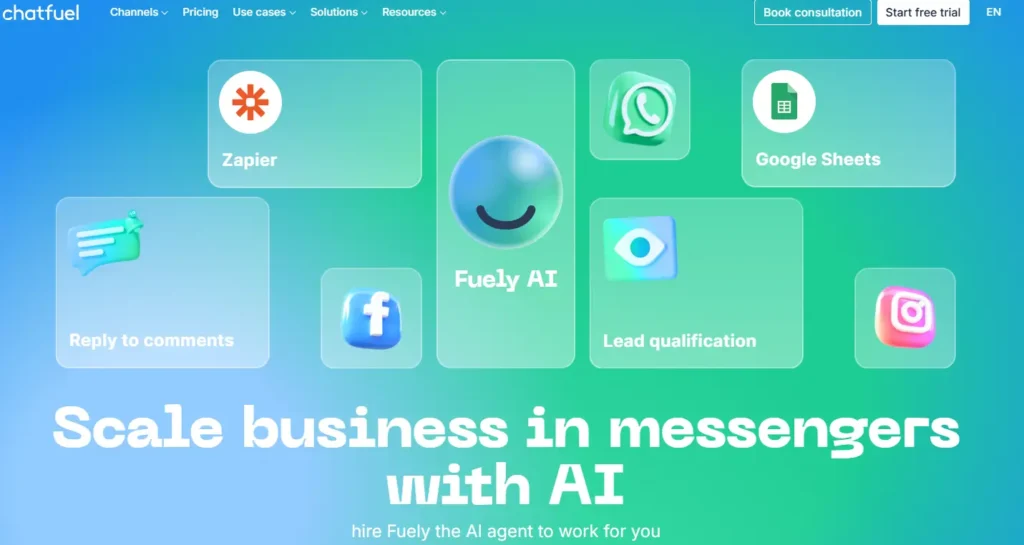
Best for: Businesses focused on social media customer support.
Chatfuel is a Facebook Messenger and Instagram chatbot that helps businesses manage customer queries, automate sales, and engage with social media audiences.
Key Features:
- AI-powered chat automation for social platforms.
- Pre-built templates for quick setup.
- E-commerce integration for automated sales.
- Custom chatbot flows with easy drag-and-drop editing.
Pricing: Free plan available; premium starts at $15/month.
9. Botsify AI Chatbot
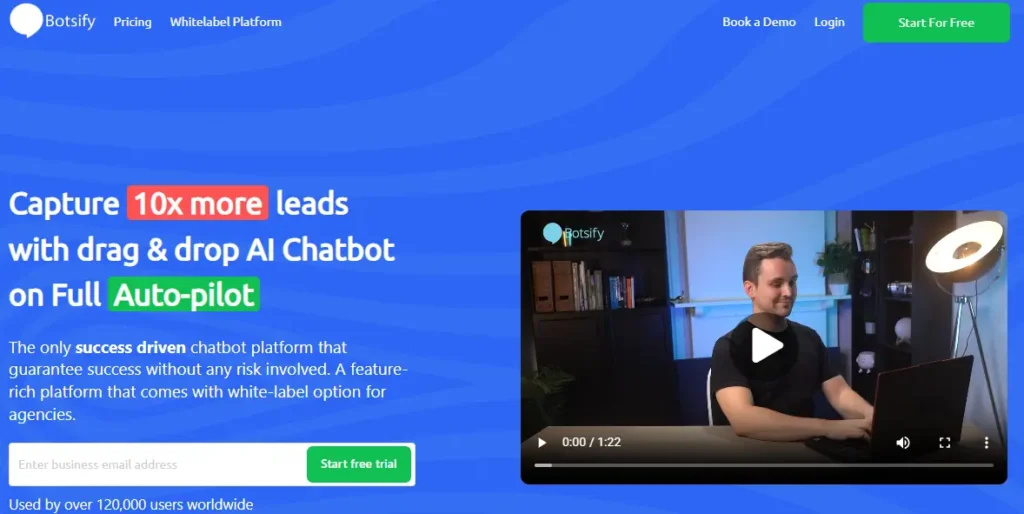
Best for: Small businesses and startups.
Botsify is an easy-to-use chatbot builder that supports multiple platforms, including websites, WhatsApp, and Facebook Messenger.
Key Features:
- No-code chatbot builder.
- Human handover option for complex queries.
- Supports voice-based AI chat.
- Lead capture and form-filling automation.
Pricing: Starts at $49/month.
10. Yellow.ai Conversational AI

Best for: Enterprises needing AI-driven automation at scale.
Yellow.ai specializes in AI-powered customer service automation, voice AI, and intelligent virtual assistants for large businesses.
Key Features:
- AI-powered voice and text chatbots.
- Omnichannel support (WhatsApp, email, website, apps).
- Customizable chatbot flows.
- Advanced analytics for performance tracking.
Pricing: Custom pricing based on business needs.
Implementation Considerations
Selecting and integrating a chatbot into customer service workflows requires careful planning. Here are some key factors businesses should consider before implementing a chatbot solution.
1. Identify Your Business Needs
Before choosing a chatbot, businesses should define their customer service goals:
- Do you need 24/7 automated support?
- Are you looking for multilingual capabilities?
- Do you want a chatbot that integrates with your CRM?
- Should the chatbot assist with lead generation or just customer support?
2. Choose Between AI-Powered and Rule-Based Chatbots
- AI-powered chatbots (like Zendesk AI or Ada AI) use machine learning to improve responses over time and handle complex queries.
- Rule-based chatbots (like Chatfuel or Botsify) follow pre-defined conversation flows and work well for handling FAQs.
SMEs with simple needs may prefer rule-based bots, while enterprises with high query volumes may benefit from AI-powered chatbots.
3. Ensure Integration with Existing Tools
Businesses should check whether the chatbot integrates smoothly with their existing customer support, CRM, and e-commerce platforms. Some key integrations to look for:
- CRM Systems: Salesforce, HubSpot, Zendesk
- E-commerce Platforms: Shopify, WooCommerce, Magento
- Messaging Apps: WhatsApp, Messenger, Slack
4. Prioritize Scalability
A chatbot should be able to handle increased traffic as the business grows. Companies should choose a platform that allows them to expand functionality, add new languages, or integrate with additional channels over time.
5. Focus on User Experience
The chatbot should offer a smooth and natural conversation flow. It should:
- Respond quickly and accurately.
- Provide clear options for escalation to a human agent.
- Work across multiple channels (web, mobile, social media).
6. Consider Pricing and ROI
Businesses should compare pricing models to determine long-term affordability. Some chatbots charge per conversation, while others have a flat monthly fee. It’s important to calculate the return on investment (ROI) by considering:
- How much time and money the chatbot will save.
- Whether it will reduce the need for additional customer support agents.
- The potential increase in customer satisfaction and retention.
7. Data Security and Compliance
Handling customer information requires compliance with regulations like GDPR, HIPAA, and ISO 27001. Businesses should verify that their chosen chatbot provider follows industry-standard security measures, including end-to-end encryption and data anonymization.
8. Test and Optimize Continuously
Once implemented, businesses should track chatbot performance and make necessary improvements. Most chatbot platforms provide analytics dashboards that show:
- Response accuracy
- Customer satisfaction scores
- Escalation rates to human agents
Regular updates based on customer feedback and AI learning improvements will ensure that the chatbot continues to deliver value.
For businesses leveraging social media platforms, tools like XYZ chatbot and ABC automation software provide seamless integration with platforms like Facebook Messenger and Instagram. Learn more about optimizing chatbot strategies in our Social Media Chatbots Guide.
Conclusion
Customer service chatbots have become essential for businesses looking to improve support, reduce costs, and scale operations. In 2025, AI-powered chatbots offer advanced automation, seamless integrations, and personalized customer interactions, making them a valuable tool for SMEs and enterprises.
This guide covered the 10 best customer service chatbots, comparing features, integrations, scalability, and pricing. Whether you need a chatbot for automating FAQs, generating leads, or providing multilingual support, there is a solution available for every business size and industry.
To choose the right chatbot, businesses should:
✅ Identify their customer service needs.
✅ Decide between AI-driven and rule-based chatbots.
✅ Ensure integration with existing CRM and messaging tools.
✅ Prioritize scalability, security, and ease of use.
✅ Regularly test and optimize chatbot performance.
With the right chatbot in place, businesses can enhance customer satisfaction, improve efficiency, and stay ahead of the competition.
Frequently Asked Questions
For small businesses, Desku, Tidio, and Converzation AI offer affordable plans with easy setup and automation. These chatbots provide essential features like automated responses, CRM integrations, and multilingual support without requiring technical expertise.
Pricing varies based on features and usage. Some chatbots have free plans (like Desku and Converzation AI ), while premium plans range from $15 to $100+ per month. Enterprise-grade solutions often use custom pricing.
Yes, chatbots like Desku, Converzation AI, and Yellow.ai support WhatsApp, Messenger, and Instagram. These chatbots help businesses automate social media responses and customer engagement.
Yes, AI-powered chatbots continuously learn from customer interactions. Many platforms allow businesses to train the chatbot by reviewing conversation logs and adjusting responses for better accuracy.

